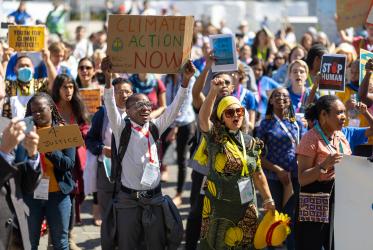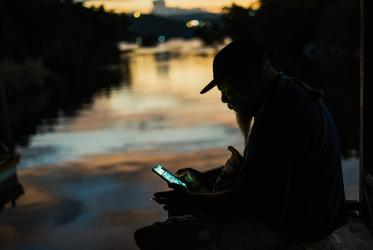However, our land has been taken over by the military in manipulative ways. Indigenous people stand to protect the land. We scream for justice amid threats but we, the landowners, lost to the military. We became helpless strangers in our land.
We are Kawasi, the oldest village on Obi Island, South Halmahera Regency, North Maluku Province. We are rich in natural products, especially nickel. Our natural wealth makes many companies come and start their business. Mines were opened in our village. Increasingly wider, until it becomes so close to the residential areas. Our forest has been cleared to be a mining site. Toduku, our river, has been polluted because it has become a dumping ground for sludge from the processing and production of nickel, sulfate, and cobalt as the raw materials for electric vehicle batteries. Our land was submerged in a flood full of thick, oily mud, which flowed into our sea. Now, we will be relocated from our village. We were driven from our land.
Marafenfen and Kawasi are the parts of Maluku and North Maluku, the parts of the GPM. Marafenfen and Kawasi are the parts of the World Council of Churches. Is our anxiety felt by our brothers and sisters in Christ? Can the sound of our wailing be heard? We are the owners of the land given by God since our ancestors but for the benefit of the few, we are enslaved in our own land.
Nature is me
In our cosmology, as Moluccans we believe that before we spread out in various regions in Maluku, we all came from an island called Seram Island or Nusa Ina (Motherland). From the womb of a mother, we were born. Our natural wealth is like a mother’s womb and transmits the descendants of the island communities. Whenever we live, nature is like a mother who provides our needs and doesn’t let our generation go hungry. Caring for nature with Sasi and other customary rules is like caring for life.
Nature is not just a locus of territory but like a person. For us, nature is “me” and not “it.” Nature seems to have feelings. Nature carries out special roles in real life in this world. It affects the pattern of our relationship with nature, which can be called dialectical-bipolar. We and our nature are interdependent. Not mutually determinant but complementary. We play the roles that make the other alive and ensure a sustainable life together. When our nature is threatened, we are also threatened. Now, when our nature is controlled for the benefit of a few people, we are disturbed and feel that this is an injustice. Not only for us, but also for other creations in this world.
Ecological justice is our responsibility
Marafenfen and Kawasi are just two of thousands of problems of ecological injustice on this planet. It is the responsibility of the church to work together to achieve ecological justice. The church cannot close its eyes to the fact of deforestation for corporate interests and, after that, leave destruction for the next generations. The church cannot “safe itself” behind high walls while fellow human beings mourn their property rights that were taken away. The church must unite to echo God’s love which is deliberating.
Remembering unity means remembering the oikoumene, and it also means remembering Jesus' prayer which is the foundation of unity itself (John 17). Jesus conveyed a message about the importance of Christian unity but at the same time, He also spoke about the missionary impact that must be seen from this unity. Oikoumene is a faith response of believers (church) to answer Jesus' prayer. We are called not only to unite but also to show the missionary impact of that unity. If so, we who are at the WCC need to unite to echoing our prophetic voice for the current situation of the world. These days, the earth (our home) is in an alarming condition. We all are facing pollution, deforestation, climate crisis, etc. What shall we do with our ecumenical movement?
Let's start with us first. We need to interpret the narrative of creation in the Bible properly so that we don't see nature separated from us (integrity of creation). The fact that God gave us power must be interpreted as a mandate from God. Therefore, it must be done wisely. Spiritual direction about nature and human, need to spread intensively in our fellowship, so that no one acts more superior than other creations and destroys our common home. God wants to save all the creation, not only humans. So that us who have responsibility to do Missio Deimust aware that as the church we also have responsibility to protect and take care of nature and other creations, as a part of our faith’s response to God. It all glorifies God, the Creator.
We need to pay attention and develop the local theology (the theology from below) to strengthen the church's sense of responsibility for caring for nature and other problems. We can develop local theology from our culture which is closed and rooted in our lives. There is local wisdom in every community that can be transformed in the light of God’s word for the life of all creation in the world. For example, Sasi in Maluku. Sasi in Moluccans culture is the way to taking care for the natural resources. It tries to ensure the survival of humans and nature. The GPM accommodates it in the church's practice based on the enforcement of the Jubilee Year. Theologically, the practice of Sasi in church rituals shows that God is present as a witness to human promises to preserve nature or prevent conflicts. The people are also educated to be responsible for God's creation and to serve others.
The World Council of Churches, with its broad echoes and networks, also needs to speak out to the local dynamics that take place at the grassroots level as a form of unity. The struggles of people in the villages and islands about ecological injustice need to be heard, prayed together, and voiced to anyone (working partners, international humanitarian organizations, etc). So that the problems and struggles of the congregations at the lowest level against various forms of injustice are not forgotten but find a bright spot for the common good.
The earth is our home. Nature is like our mother which by her God provides everything we need. Let us protect and take care of it. Speak up for ecological justice; move for our lives today and our generations tomorrow. So that the world will know that God sent us for them and God loves them. Greeting from Maluku, Indonesia!






